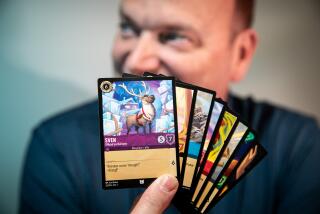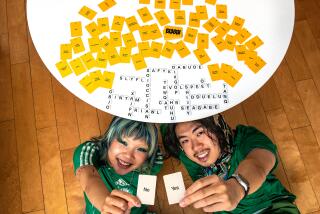Newport Beach Version : Is a Game by Any Other Name Not a Monopoly?
- Share via
Bet you thought monopolies were illegal.
Well, they usually are--unless it’s the monopoly on Monopoly.
Parker Brothers says it has the rights to the world’s best-known board game and any obvious variations. And that includes Newportopoly, a takeoff on the original with Newport Beach business names.
Newportopoly was a sellout hit at selected Orange County retail outlets last holiday season, and its local creators are gearing up to go into a second production run.
In addition, the two partners of G&L; Enterprises of Laguna Beach say they are thinking about putting out a Los Angeles edition of the game and maybe additional versions based on other areas in Southern California.
But Parker Brothers may have something to say about those plans.
The Beverly, Mass., game manufacturer owns the copyright and trademark to Monopoly, the classic, wheeler-dealer board game invented in 1933 by Charles Darrow.
Based on Atlantic City place names, Monopoly still earns Parker Brothers millions of dollars annually. In 1985, sales of the game in the United States alone netted the company $24 million.
And according to Manhattan lawyer Steven Weinberg, who represents Parker Brothers, “the Monopoly (trademark and copyright) are alive and well and registered and enforceable. . . .”
“The very fact that people call their games ‘opoly’ and set up a board to look like the Monopoly board indicates they’re trying to ride off the reputation that Parker Brothers has in the Monopoly symbols,” Weinberg said.
Geoffrey A. Airey and Lacy Michelle Johnston--the two young entrepreneurs who produced Newportopoly and founded G&L; Enterprises--said they consulted an attorney about legalities before introducing their board game and were assured that it was all right.
“One of our main concerns is that we weren’t infringing on anyone else,” Johnston said in an interview Tuesday. “We’re not interested in getting into any problems here.”
Weinberg, it turns out, wasn’t even aware of the existence of Newportopoly until a reporter called to ask about Parker Brothers’ approval of that and similar ventures. It seems that the manufacturer gets calls “every day” from people who want to use the game or its trademark, said company spokeswoman Patricia McGovern. While some are approved, she said, “we very aggressively protect the Monopoly trademark.”
Weinberg said he cannot give an opinion on Newportopoly until he sees the game. But if Parker Brothers decides to challenge its production, it will be the latest in a series of hassles that G&L; Enterprises has had in producing the game.
Johnston said she “had the idea in her head” for some time before she approached Airey last September about actually putting it out. She said she later learned that the idea wasn’t exactly new.
According to Weinberg, about 20 cities across the country have put out personalized real-estate board games, often to raise money for local civic groups.
He said Parker Brothers objects only to those games that it considers “substantially similar” to Monopoly.
The idea of personalizing the game to Newport Beach seemed a natural, Johnston said. “That’s probably the most exclusive city in Orange County,” she said. “People here identify with Newport Beach.”
The challenge: Start at go, produce the game and get it into stores with just a few months before Christmas.
Armed with her concept only, Johnston began trotting to local businesses, explaining her idea and mentioning La Jollaopoly, a similar game based on La Jolla place names. La Jollaopoly was produced in 1987 by an unrelated company.
Johnston concentrated on companies that would seem to want the sort of “long-term advertising” she was selling. For $350, she would print a business’s name, telephone number and a small slogan on a Newportopoly space. The original idea was to produce 1,000 games.
At first, the idea didn’t exactly outsell hot cakes. Some businesses--yacht brokers and beauty salons, for example--just weren’t interested. But others--notably hotels, restaurants and an auto dealership--were very enthusiastic indeed.
“I like promotions that are community related, and I’m always looking for new ideas and creative things. This sounded workable,” said Jim Wood, manager of Merrill Lynch Realty in Newport Beach
Wood invested about $4,000. He paid $550 to be on the “Risk” space--Newportopoly’s equivalent of the “Chance” or “Community Chest” cards. The rest was to purchase 300 games at a wholesale price of $12 each to use as holiday promotions for Merrill Lynch clients.
“It’s great for kids because it’s got local areas. And it’s just different. It’s not something that everybody has,” said Mike Martin, owner of Balboa Pharmacy, which plunked down $350 for an orange space on the Newportopoly board.
But after the 28 board spaces were sold, Johnston and Airey found that their problems were just beginning.
For one thing, it turned out that everybody wanted to be on blue, green, yellow or red spaces. “People would say, ‘You’re not going to put me on the cheap spaces, are you?’ ” Johnston recalled.
Then there were more practical problems: How do two recent UCLA graduates--with backgrounds in sports medicine and economics--come up with art? And a game board? Then a matching box, deed cards, instruction cards, fake money, and teensy red and green, plastic houses? And then, how to get it into the stores?
But once the bugs were worked out, the game was a startling success.
Instead of the 1,000 games Johnston and Airey originally planned to produce, they ended up making and selling their entire stock of 2,500 games.
The games were carried at Nordstrom, Bernans in Costa Mesa, At Ease at Fashion Island and the Toy Shop in Corona del Mar.
“It was fabulous. We sold 48 of them the first day we put them on the floor,” said Peggy Zamberlan, general manager of Bernans. The children’s department store ended up selling at least 130 of the games in about 4 days at $23 apiece, said Zamberlan.
The initial printing of 2,500 games grossed Airey and Johnston about $26,000--about half of which was profit.
According to their lawyer, Thomas Juettner, a copyright and trademark specialist with San Diego’s Juettner, Pyle, Lloyd & Verbeck, producing Newportopoly should be no problem from a legal standpoint.
“Newportopoly is not a copy of Monopoly,” the attorney said. “The idea for the game is the same, but the game is not. My clients did not copy the Monopoly game--and copyright law protects expression of ideas. It doesn’t protect ideas per se.”
Even so, to look at Newportopoly, there are some striking similarities to the original board game.
G&L;’s version, for instance, reproduces the Monopoly color combination on its board and the particular order of the properties. There are orange and yellow cards--albeit called Risk and Newport Treasures instead of Chance and Community Chest. And just like Monopoly, the Newportopoly corners have squares marked “Go,” “Free Parking,” Just Visiting” with a cartoon of man behind bars, and “Go to Jail” with a cartoon of a policeman.
Airey and Johnston are optimistic that their game is different enough that it won’t cause a problem. For one thing, Johnston pointed out, the word Newportopoly is written horizontally across the board--not diagonally, like the original game. And Newportopoly has a colored cartoon on its board--whereas the original game has no such drawing.
But Parker Brothers’ lawyer says those differences may not mean much in the long run.
Parker Brothers has valid copyright and trademark protection, he said. And as far as Juettner’s argument that Newportopoly only borrows the Monopoly idea, “every defendant in every case in copyright always claims they’re just using the idea. . . . That’s the classic defense.”
In fact, Weinberg said, under copyright law, “the test is not how dissimilar” something is.” Instead, “it’s whether an ordinary person would believe that No. 2 was copied from No. 1. Or are people likely to be confused into believing that Parker Brothers has sponsored, or is in some way connected with No. 2.”
“If the answer is yes,” he said, “there’s copyright infringement.”
More to Read
Inside the business of entertainment
The Wide Shot brings you news, analysis and insights on everything from streaming wars to production — and what it all means for the future.
You may occasionally receive promotional content from the Los Angeles Times.










